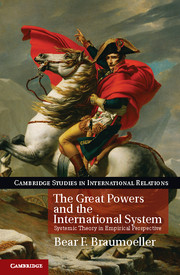Book contents
4 - Systems in historic perspective
Published online by Cambridge University Press: 05 January 2013
Summary
Investigating the origins of state behavior, like any other social science investigation, should not stop with an estimation of the magnitude of the relationship among theoretically relevant variables; it should also assess the plausibility of the causal mechanism that the theory posits (Gerring 2007, 43–48). This chapter, therefore, contains a different form of historical investigation than the previous chapter. Rather than examining a large number of cases over the entirety of the period between the end of the Napoleonic Wars and the end of the Cold War, it takes a more focused, in-depth look at three events of considerable interest to students of international politics – the polarization of the European continent after the Vienna settlement, the end of American isolationism, and the end of the Cold War.
Each of these cases demonstrates the utility of a systemic perspective. Each case represents a full cycle of systemic politics: in each, a state acts to produce a change in the structure of the international system, and that change in the structure of the system produces a subsequent change in the behavior of the actors. The importance of the structure of the system can be understood counterfactually, by asking whether the actors change their behavior based solely on their understanding of one another's characteristics; in each case, there is a period after the change in the actors' characteristics, but before the change in the structure of the system, that provides a critical test.
- Type
- Chapter
- Information
- The Great Powers and the International SystemSystemic Theory in Empirical Perspective, pp. 112 - 193Publisher: Cambridge University PressPrint publication year: 2013

